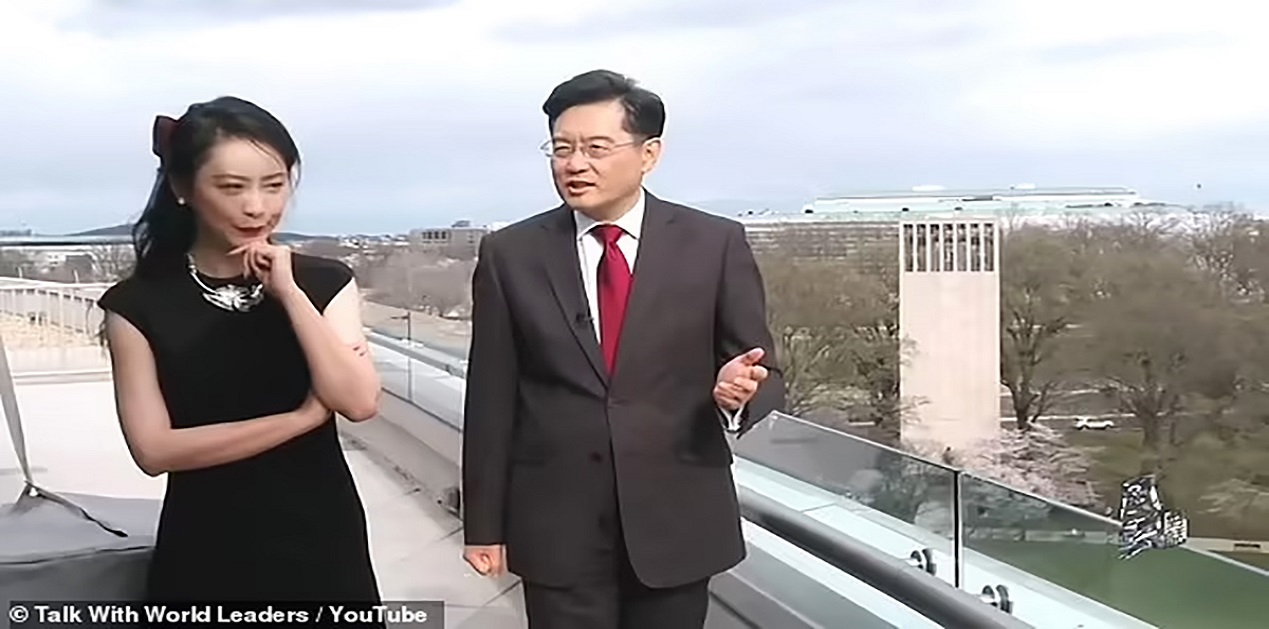The decision taken by stern faced members of China’s National People's Congress Standing Committee (NPCSC) at an emergency meeting on July 25 to replace Qin Gangas Foreign Minister with his predecessor Wang Yi was very unusual. The NPCSC did not, however, divest him of his rank as State Councilor though it is empowered to do so. The NPCSC resolution also pointedly stated that Xi Jinping had signed-off on the decision to replace him as Foreign Minister. The NPCSC decision was, incidentally, taken when Wang Yi was attending a BRICS conference in South Africa. Regardless of whether it is finally revealed that Qin Gang is seriously unwell or resurfaces, the recent developments point to the political situation in China not being all that stable as some analysts maintain.
Pools of potential opposition to Chinese President Xi Jinping have existed in Chinese society at least since around 2017, when he made known his intention to break with convention and continue in power beyond the two terms for China's top three posts. Dissatisfaction against Xi Jinping has simmered since then among senior and veteran cadres, Chinese entrepreneurs and businessmen and unemployed graduates or those who haven't got jobs commensurate with their qualifications. The low growth rates and China’s slowing economy have contributed to this. The excessively stringent quarantine restrictions imposed during Covid fuelled popular anger and added to the economic slowdown. Though the NPCSC resolution did acknowledge Xi Jinping's authority by saying he had approved their decision, there have been other indicators that resentment against Xi Jinping is building.
The latest episode of Qin Gang’s unexplained absence since June 25 and his "removal" from the post of Foreign Minister is one instance of probable inner-Party opposition to Xi Jinping. There is as yet no official report on Qin Gang's whereabouts or the reasons for his absence. While he has been replaced as Foreign Minister, Qin Gang continues to retain his rank of State Councilor, which places him above a Minister but below a Vice Premier. His retaining the rank suggests that Xi Jinping has not yet decided to abandon Qin Gang. In case Qin Gang is not under investigation, he could either return to his former position or be appointed elsewhere. The appointment of Wang Yi as Foreign Minister appears to be temporary -- the last time a Politburo member was Foreign Minister was in the late 1980s when Qiao Shi was Foreign Minister. More importantly, if Qin Gang is indeed placed under investigation in the next few weeks it would undermine Xi Jinping's position since he had promoted Qin Gang twice in the last two years, bypassing other senior candidates, to two prominent positions, namely China's Ambassador to the US and as Foreign Minister. Xi Jinping had also approved his selection as a member of the Central Committee (CC) of the Chinese Communist Party (CCP) at the 20th Party Congress in October 2022 when he was not even an Alternate Member of the CCP CC.
Within the CCP an affair by itself is not cause enough to punish a cadre. The case of retired Vice Premier Zhang Gaoli, who was accused by Chinese national Tennis player Peng Shuai of sexual assault in November 2021, was definitively suppressed with Peng Shuai subsequently retracting her allegation. They had been having an affair for many years. There are reports of many senior CCP cadres who have been divorced and have numerous concubines! Speculation about Qin Gang’s affair with Phoenix TV anchor Fu Xiaotian and her having been recruited by British Intelligence also appear unfounded. However, the email allegedly originated by her while on her way back to China did suggest she was under some coercion by China’s Ministry of Public Security, also called the "knife handle", but doubts persist whether it is linked to Qin Gang.
Qin Gang himself has a strong Intelligence background. He served many years in the Chinese Communist Party (CCP)'s International Liaison Department (ILD) before being brought by Xi Jinping to the Ministry of Foreign Affairs (MoFA) in 2008. In 1988, Qin Gang did not graduate from China’s training academy for diplomats, namely the China Foreign Affairs University. He graduated instead from Beijing’s University of International Relations, well-known for its affiliation with the CCP’s Intelligence services. A report by the Australia Strategic Policy Institute (ASPI) cautions that UIR “is designated very high risk for its affiliation with the Ministry of State Security (MoSS), China’s foreign intelligence agency.” As was to be expected, upon his graduation, Qin Gang was assigned to the MoSS-run “Beijing Diplomatic Services Bureau” (北京外交人員服務局), from where he was deputed to work in the Beijing bureau of United Press International.
At the same time, competent reliable analysts say there are indications to suggest that former Politburo Standing Committee (PBSC) member Zeng Qinghong is orchestrating opposition to Xi Jinping. The appearance of reports of Qin Gang’s affair with the Phoenix TV anchor Fu Xiaotian bears the fingerprints of Zeng Qinghong. An affair is not enough to discredit a CCP official. However involvement with a foreign Intelligence organisation is a different matter and viewed very seriously. This especially after Chongqing Public Security Chief Wang Lijun sought asylum in 2012 in the US Consulate General in Chengdu in a bid to avoid capture by China’s Ministry of Public Security (MPS) or Ministry of State Security (MoSS). But Zeng Qinghong's style has been to put out such rumours to discredit cadres. He is also known to be vindictive. In China's political circles the saying is that no one wants to get on Zeng Qinghong's wrong side! Former CCP General Secretary Jiang Zemin and his aide Zeng Qinghong are known to have regretted agreeing to Xi Jinping's appointment as Party Secretary of Shanghai and had been opposed to him.
In addition, the MoFA is an intrigue-ridden bureaucracy. China's Foreign Service officials are very competitive and the number of posts at higher levels is few and it is well known for its officials stabbing each other in the back. Qin Gang’s rapid rise will have antagonised not only people in MoFA but also China's former Foreign Minister Wang Yi. Wang Yi would have resented that while he had to wait almost double the time as Qin Gang to be appointed Foreign Minister; Qin Gang was appointed Foreign Minister and State Councilor. Further, with Qin Gang’s appointment Wang Yi's authority within the MoFA will have got diluted as Qin Gang had a direct link to Xi Jjinping.
But one thing is certain, namely that Xi Jinping will not go down without a fight. The fact that it took nearly 30 days -- from June 25 -- to remove Qin Gang from his position as Foreign Minister suggests that it was preceded by protracted and tough negotiations. This is despite the fact that the position of Foreign Minister being one that is constantly in the public eye. Furthermore, in addition to Xi Jinping being credited with promoting Qin Gang as Ambassador to the US and soon thereafter as Foreign Minister is that Qin Gang was approved by Xi Jinping as CCP CC Member. The People’s Daily and Xinhua had, at the time of the 20th Party Congress, specifically said that all candidates for elevation as CC or Alternate CC members had been vetted by a special group in the CCP CC’s Organisation Department and been personally confirmed by Xi Jinping. For Qin Gang to now have been removed from his position certainly dents and undermines Xi Jinping's authority. Interesting in this context is that while MoFAs official website promptly erased all references to Qin Gang as far back as March 2023 by June 26, raising the prospect of his being placed under investigation, all references to him were restored in July on the official website. Further, his actions and remarks as State Councillor remain on China’s official websites.
At the same time, Xi Jinping has begun shoring up his position. A significant move was the promotion and appointment of Wang Zhizhong as a new Deputy Minister of Public Security (MPS). He is a veteran of the MPS Special Duty Bureau (SDB), which oversaw Xi Jinping's security when he was Vice President from 2008-13, and is likely to continue to oversee the SDB. Wang Zhizhong worked under Minister Wang Xiaohong from 2019-21 and the current CDIC Chief Li Xi in Guangdong from 2021-22. Xi Jinping will use him and the Minister of Public Security Wang Xiaohong to closely monitor senior CCP cadres, weed out those whose loyalties are suspect and keep them in line.
(The paper is the author’s individual scholastic articulation. The author certifies that the article/paper is original in content, unpublished and it has not been submitted for publication/web upload elsewhere, and that the facts and figures quoted are duly referenced, as needed, and are believed to be correct). (The paper does not necessarily represent the organisational stance... More >>
Image Source: https://im.rediff.com/news/2023/jul/18qingang1.jpg?w=670&h=900










Post new comment